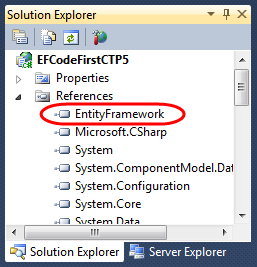

- #Entity framework ef not in command line update
- #Entity framework ef not in command line upgrade
- #Entity framework ef not in command line code
- #Entity framework ef not in command line mac
#Entity framework ef not in command line upgrade
NET Core 1.x-2.x but neither or I could get it to work for 3.x – and thus pushed off the 3.x upgrade until we were forced due to other environment dependencies. We were previously using Migrator.EF6 for.
#Entity framework ef not in command line update
NET Core 3.1 update we could not get VS migrations to work with our project (v 15.1.4-47270). We even tried spinning up VMs so we can perform the migrations from Windows + Visual Studio, but as of the latest.
#Entity framework ef not in command line mac
"Visual Studio" (ie: Xamarin MonoDevelop) on Mac has no support for EF migrations as far as we can tell.
#Entity framework ef not in command line code
For example, they create migrations, apply migrations, and generate code for a model based on an existing database. Rider did not add the support for EF6 migrations (given Microsoft's own indifference I imagine they did not want to hunt for workarounds themselves and were waiting on you guys to provide official support). The command-line interface (CLI) tools for Entity Framework Core perform design-time development tasks. NET CORE is that it's supposed to be cross-platform, and thus why we use it from our Mac/Rider environment. Your defense/work-around mindset for this is only feeding the thanks for chiming in.Īs I have repeatedly stated we do not run on Windows / Visual Studio. This needs to be resolved ASAP and without expecting the community to do Microsoft's own internal development. Quit defending the complete ball-drop on this. NET Core is ALL about running in non-Windows environments (read the mission/purpose) – literally ' cross-platform' and ' command-line tools' are two of the main stated goals lol NET Framework/Windows environments, to forking and debugging 3rd party stop-gap solutions like Migrator.EF6 – let alone adopting and then fully-downgrading from EF Core due to the ridiculous unreadiness on that front that's been the case along this whole journey (#side-vent). We've exerted all sorts of needless engineering efforts for this, from splitting our servers into needlessly-isolated micro-services to reduce the impact of how many projects have to be stuck on. We've tried everything from buying multiple machines to deal with this, running boot partitions, and now slow and resource-eating VMs. We literally can't add a column to our domain models without spinning up a Windows VM, developing in a duplicated repo/IDE and have been in this state of affairs for the past 2+ years. This is a basic functionality of making ANY mutations to your data model, and Microsoft shouldn't be relying on third parties to deliver mission-critical parts of their own frameworks/platforms. NET Core 3.1.This has nothing to do with Migrator.EF6. Provisioning.ConsoleApp is the dummy project with a dependency on the DataLibrary and targets.Provisioning.DataLibrary holds the DbContext with all of its models and targets.What they don’t clearly explain, is that you then need to do some extra steps to get the EF Core tooling (like migrations) working. If you are considering upgrading from EF6, please read our guide to port from EF6 to EF Core. The docs already indicate to create a dummy project with a dependency on the. EF7 is the successor to EF Core 6.0, not to be confused with EF6. Do note: I happen to still have the version ‘2.2.7’ of the EF Core tools installed, not sure how this behavior is with the newer versions. Next time I run into this issue, I should be able to find the solution quicker 😄. The documentation link does point you in the right direction, but it wasn’t as easy to find. For more information on using the EF Core Tools with.

NET Framework that references this project, and set it as the startup project using -startup-project or, update this project to cross-target. NET Command-line Tools with this project, add an executable project targeting. There is no runtime associated with this framework, and projects targeting it cannot be executed directly. Startup project '' targets framework '.NETStandard'.


 0 kommentar(er)
0 kommentar(er)
